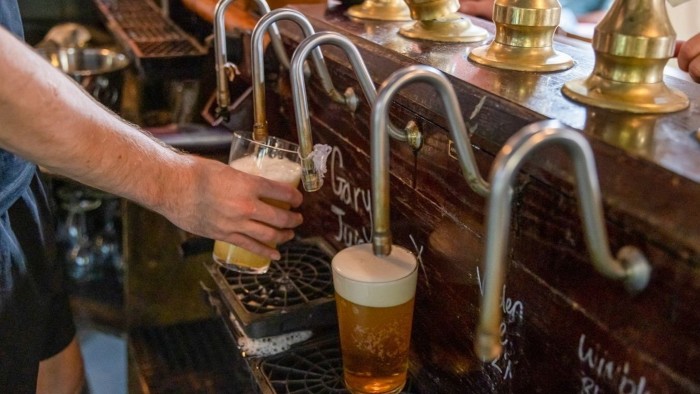Unlock the Editor’s Digest for free
Roula Khalaf, Editor of the FT, selects her favourite stories in this weekly newsletter.
It has long been the job of the pub landlord to listen as regulars drown their sorrows. Now, it’s the publicans themselves who need a sympathetic ear: people are drinking less while running costs for establishments, notably taxes, have rocketed. But, as drinkers well know, it is always darkest just before opening time.
Over the past 10 years, shares in each of the five listed UK pub groups have lost ground. If a brave investor had backed the same groups in the depths of the pandemic five years ago, only one of them, All Bar One owner Mitchells & Butlers, would help mitigate the losses suffered by JD Wetherspoon, Young & Co, Marston’s and Fuller, Smith & Turner.
A sharp jump in employee taxes from April is the latest hangover for the labour-intensive sector, which was already coping with changing drinking and social habits: a quarter of pubs have closed this century leaving about 45,000 open, according to the British Beer & Pub Association.
However, in the past three months each of the listed operators has outperformed the FTSE 250. Britain’s unusually sunny spring and summer — so far — is one reason the droop has been reversed.
Bargain hunting is another factor. The listed pub groups trade at prices, relative to expected earnings, well below their long-term averages. Young & Co and Marston’s are valued at 13 and 5 times earnings respectively, both less than half their historic norm. All have large collections of freehold properties and even when not pledged for loans, some are trading at about half their net asset value, say Panmure Liberum analysts.
Moreover, pubs are working harder to entice customers as what was once a habit for many becomes a choice. Brewer Heineken in May committed £40mn this year to the “Great British local” with upgrades to a swath of its 2,400 outlets.
Several operators are promising changes and improvements. These include offering wider ranges of low and no alcohol drinks, cultivating a new kind of “regular” with loyalty schemes and squeezing in more themed events around big occasions such as Halloween.
Existing regulars may sob into their pewter pint mugs to see their local touting, say, kids’ pumpkin carving come October. But pubs have always evolved. Writer George Orwell, describing his ideal Moon Under Water city pub in 1946, reckoned beer tasted better served in china mugs and lamented the disappearance of strawberry pink ones. Perhaps a hipster pub might reintroduce them?
Pubs these days cover the gamut from standing-room-only city boozers where a packet of crisps still constitutes the food menu, to the oak-beamed country hostelries of tourist dreams. Those which have not called last orders are a resolute bunch, and look cheap. It could be time to get a round in.
